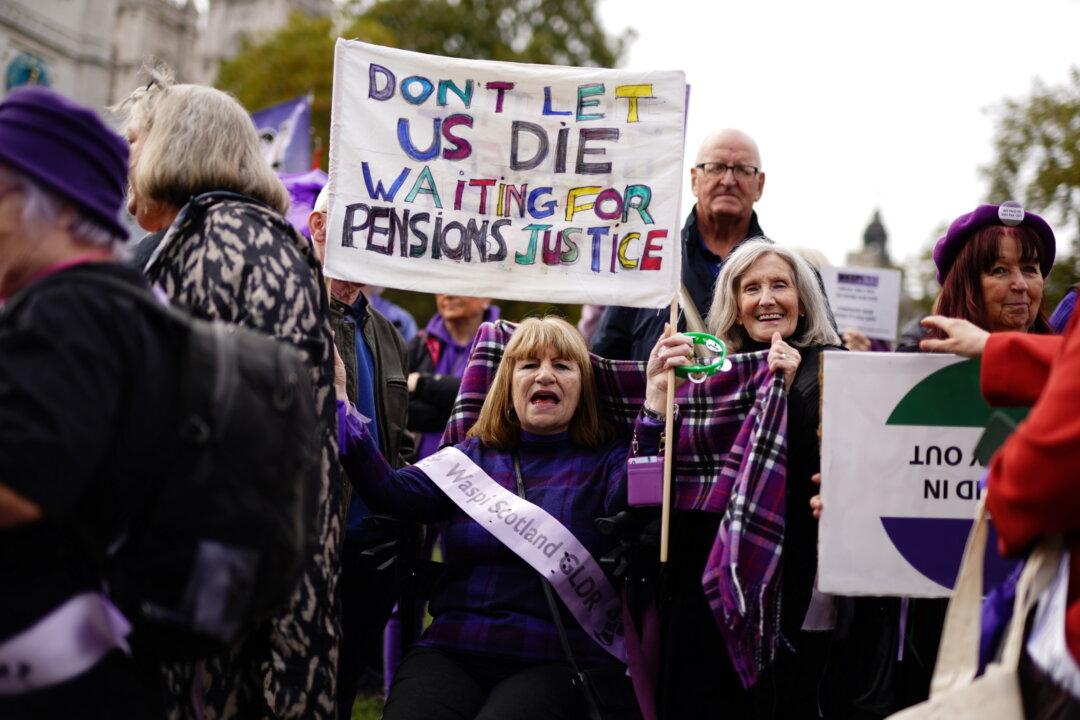The government is facing pushback from campaigners and MPs over its decision not to compensate women born in the 1950, known as WASPI women, affected by the way changes to the state pension age were communicated.
An investigation by Parliamentary and Health Service Ombudsman (PHSO) found that the government has failed to adequately inform women born in the 1950s about the increase in their state pension age.
Traditionally, UK women claimed state pensions at 60, while men did so at 65. Laws passed in 1995 and 2011 raised women’s pension age to align with men at 65, later increasing it to 66.
Women born in the 1950s saw their pension age rise by up to six years, which they said left them with insufficient time to adjust their retirement plans.
In March 2024, the Ombudsman recommended that affected women should receive compensation ranging from £1,000 to £2,950, depending on individual circumstances.
However, Kendall told the Commons on Tuesday that the government will not be providing the financial compensation. She said that most women were aware of the changes and did not suffer direct financial losses, making compensation unnecessary and unaffordable for taxpayers.
Kendall also pointed out that the previous administration had not allocated any funds for a compensation scheme and had left a £22 billion deficit in public finances.
Before they were in government, several leading Labour politicians, including Kendall, Prime Minister Sir Keir Starmer, Chancellor Rachel Reeves and Deputy Prime Minister Angela Rayner said they would get compensation for WASPI women.
Kendall told the Commons that it has “been an extremely difficult decision to take” but added it was “right and fair.”
WASPI chairwoman Angela Madden said the government has chosen to disregard the clear recommendations of an independent watchdog.
“This is a bizarre and totally unjustified move which will leave everyone asking what the point of an ombudsman is if ministers can simply ignore their decisions. It feels like a decision that would make the likes of Boris Johnson and Donald Trump blush,” she said.
Madden criticised the proposed action plan to prevent future mistakes as “an insult to both the women affected” and to the PHSO investigation into the communication of state pension age changes.
“A significant majority of MPs support WASPI’s call for fair compensation, and all options remain open. Parliament must now find an alternative way to bring this issue to the forefront and ensure justice is served,” she added.
Following Kendall’s announcement, reactions poured from MPs across the political spectrum, including from the ruling Labour party.
Liberal Democrat work and pensions spokesman Steve Darling said the government’s decision “is nothing short of a betrayal of WASPI women.”
“I am shocked that the Government are taking a pick-and-mix approach to those findings, and we therefore ask the Secretary of State to seriously reconsider the decision,” he added.
The leader of the Scottish Nationalist Party (SNP) at Westminster, Stephen Flynn, suggested the government put the decision through a Commons vote. In response, Kendall said there could be a vote in the Scottish Parliament if the SNP government decided to do that.
Conservative MP Dame Caroline Dinenage asked whether the decision not to compensate WASPI women was due to the mitigation being “too complicated and that it is someone else’s fault.”
Kendall stressed that the government believe that 90 percent of women aged 45 to 54 knew the state pension age was increasing and that a £10.5 billion compensation scheme wouldn’t be a “fair or proportionate use of taxpayers’ money.”
She pointed to the Ombudsman’s report underestimated the widespread awareness among 1950s-born women about the state pension age increase, citing evidence that 73 to 90 percent of women 45 to 54 knew about the changes by 2004-2006.
The suggested approach by Ombudsman of assessing individual circumstances for 3.5 million women would be logistically unfeasible and costly, Kendall told MPs.
She stressed that the government’s protection of the triple lock will see an increase of the state pension by to £1,900 a year by the end of this parliament.
Asked by Tory MP Diane Abbott whether he understands how let down WASPI women feel, Starmer said on Wednesday that he understand the concern but added that taxpayers cannot afford the burden of the compensation payments.







